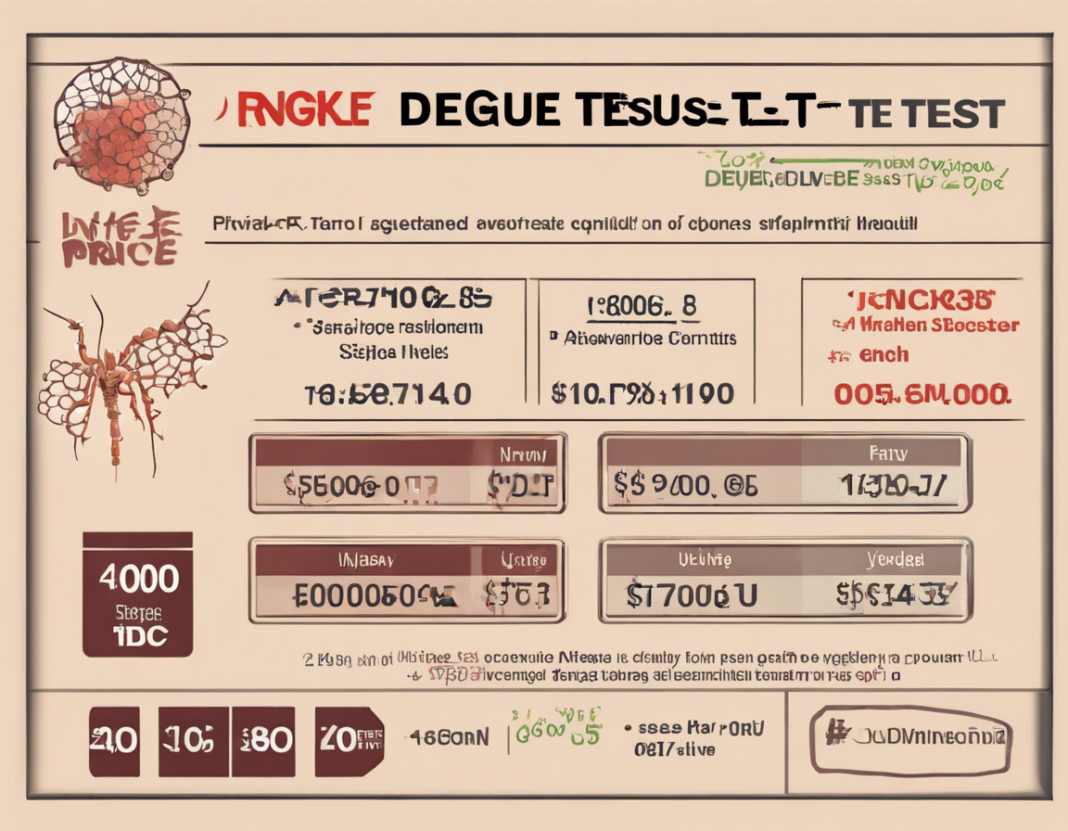Introduction
Dengue fever is a mosquito-borne viral infection that causes flu-like symptoms and can be potentially life-threatening. Timely detection and diagnosis are crucial for effective management of the disease. Dengue test price can vary depending on the type of test, the location, and the healthcare provider. In this comprehensive guide, we will explore the different types of dengue tests available, their costs, and the importance of early detection.
Types of Dengue Tests
-
NS1 Antigen Test: This test detects the presence of the dengue virus in the blood. It is usually done during the first week of illness when the virus is still circulating in the bloodstream. The cost of an NS1 antigen test can range from $20 to $50.
-
Dengue IgM and IgG Antibody Tests: These tests detect antibodies produced by the immune system in response to the dengue virus. IgM antibodies are usually detectable during the early stage of infection, while IgG antibodies appear later. The cost of IgM and IgG antibody tests can range from $30 to $80.
-
Polymerase Chain Reaction (PCR) Test: This test detects the genetic material of the dengue virus and is considered highly accurate. It is often used to confirm dengue infection in patients with ambiguous test results. The cost of a PCR test can range from $50 to $100.
Factors Affecting Dengue Test Price
-
Healthcare Provider: The cost of dengue tests can vary between different healthcare providers, including hospitals, clinics, and laboratories.
-
Location: The price of dengue tests may differ based on the region or country where the test is being conducted.
-
Insurance Coverage: Some health insurance plans may cover the cost of dengue testing, reducing the out-of-pocket expenses for the patient.
-
Testing Facilities: Tests conducted at larger, more specialized laboratories may cost more than those done at smaller facilities.
Importance of Early Detection
Early detection of dengue fever is crucial for several reasons:
-
Prompt Treatment: Early diagnosis allows for timely initiation of treatment, which can help prevent complications and improve outcomes.
-
Prevent Spread: Identifying and isolating dengue cases early can help prevent the spread of the virus to others through mosquito bites.
-
Prevent Misdiagnosis: Symptoms of dengue fever can mimic other illnesses. Early testing can help differentiate dengue from conditions with similar symptoms, reducing the risk of misdiagnosis.
Cost-Effectiveness of Dengue Testing
While the cost of dengue testing may vary, it is essential to consider the long-term benefits and cost-effectiveness of early detection. Undiagnosed and untreated dengue cases can lead to severe complications, hospitalization, and increased healthcare costs. Investing in timely testing and diagnosis can ultimately save money by preventing complications and reducing the overall burden of the disease.
Frequently Asked Questions (FAQs)
- How is dengue fever diagnosed?
-
Dengue fever is diagnosed through blood tests that detect the presence of the dengue virus or antibodies produced by the immune system in response to the virus.
-
What are the common symptoms of dengue fever?
-
Common symptoms of dengue fever include high fever, severe headache, joint and muscle pain, nausea, vomiting, and skin rash.
-
Is there a vaccine for dengue fever?
-
A vaccine for dengue fever is available in some countries for individuals aged 9-45 years. However, it is not universally recommended and may not be suitable for everyone.
-
Can dengue fever be treated?
-
There is no specific antiviral treatment for dengue fever. Treatment usually involves supportive care to alleviate symptoms and prevent complications.
-
How can dengue fever be prevented?
- Dengue fever can be prevented by avoiding mosquito bites through measures such as using insect repellent, wearing protective clothing, and eliminating standing water where mosquitoes breed.
Conclusion
Timely and accurate diagnosis of dengue fever is essential for effective management and prevention of complications. The cost of dengue testing may vary, but the long-term benefits of early detection far outweigh the expenses. By understanding the different types of tests available, their costs, and the importance of early detection, individuals can take proactive steps to protect their health and well-being. If you suspect dengue fever or are experiencing symptoms, consult a healthcare provider for appropriate testing and care.









